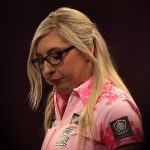As the image-making powers of computer programs such as Midjourney startle and delight the masses, the Los Angeles County Museum of Art launches an exhibit of art made by or with computers in their early days (or just inspired by them).
“Coded: Art Enters the Computer Age, 1952–1982” shows that the intersection between computers and art in those early days produced rather slight results. Sure: For those of us who remember the world before the TRS-80, the gosh-wow shines through of, say, making a machine dump ink at programmed points on a grid or draw nonintersecting lines between randomly generated points. It is amusing seeing psych-survey answers about people’s attitudes toward shoes numericized and plotted in what looks like a dot matrix printer who took a quarter hit of acid, in Sonya Rapoport’s Shoe-Field Map. But what computers could do back then in depositing pigments on paper was aesthetically limited even if futuristically thrilling.
As the exhibit’s wall text notes, some artists of that era, who loved conceptual ironies and upending convention, enjoyed how programs and algorithms allowed them “to diverge from the notion of a unique, authoritative presentation of a work.” In the artificial intelligence age, when a program can dump out within minutes dozens of “unique, authoritative” works that would take a person weeks to make, these conceptual plays may turn around and bite human creators.
The post Review: Computer-Generated Art, Decades Before Midjourney appeared first on Reason.com.







